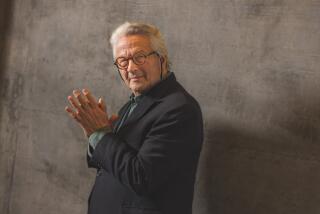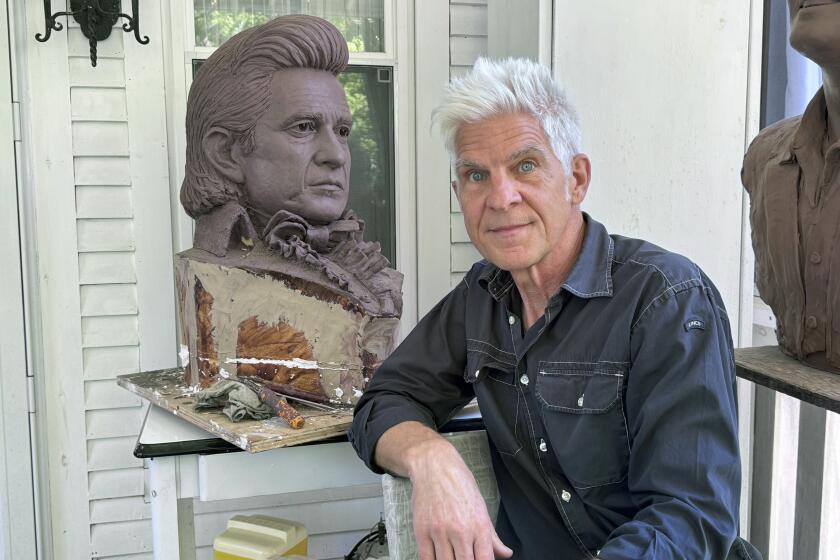Hollywood Remote--and on a Budget : Entertainment: Valencia Studios offers big, no-frills production space at a fraction of the going rate in Hollywood or Burbank.
The license plate on the 10-year-old Mercedes owned by Robert Thompson, founder and president of Valencia Studios, reads “BBY MOGL.” He might just become a baby mogul. The 35-year-old Thompson has developed a remote version of Hollywood in the Santa Clarita Valley by offering film and TV producers big, cheap, no-frills studios that have been fashioned out of industrial buildings.
At a time when independent production companies are under increasing pressure to contain costs, Valencia Studios offers production space for 30% to 50% less than the established studios in Hollywood and Burbank. A sound stage at Valencia Studios rents for $9,000 to $30,000 a month, and production office space runs about $1.25 per square foot.
Producers can also cut corners even more by bringing in non-union crews to Valencia Studios, whereas the major studios such as Paramount, Universal and Disney usually require producers to hire unionized production help.
“We’re the Target stores of the industry,” said Thompson, referring to the discount retailer.
Valencia Studios has caught on in part because its four buildings and 125,000 square feet of production space, about 25 miles north of Hollywood, not far from the Magic Mountain amusement park, are basically low-cost, converted warehouses. Budget-minded producers are increasingly using warehouses as an alternative to high-priced Hollywood studios.
“What they are doing out in Valencia is industrializing the warehouse concept,” said TV producer Leonard (“Rags to Riches”) Hill. “The concept is a terrific one.”
TV shows such as “Tour of Duty,” a CBS drama about the Vietnam war, and the daytime soap “Divorce Court” shoot at Valencia Studios. Horror films such as “The Blob” and “Nightmare on Elm Street, Part 4” were shot at Valencia, and the sequel to the Oscar-winning film “Chinatown,”--”The Two Jakes,” directed by Jack Nicholson--recently completed some filming there as well.
“I love those studios,” said Deborah Moore, executive vice president in charge of production for New Line Cinema, which produced the “Nightmare on Elm Street” films. “The rate was very good for what we need, which is massive amounts of warehouse space.”
Bob Jaffe, co-executive producer of “Divorce Court,” also finds Valencia’s cheap stages a big draw. “In Hollywood, if you can find the space, they want an arm and a leg,” he said. “It’s either controlled by unions or they have ridiculous rules and regulations that hamstring you.” The show, which started filming at Valencia Studios in September, previously was shot at Sunset-Gower Studios in Hollywood, and Jaffe estimated savings of about $10,000 a week by filming at Valencia.
Demand for studio space has been enough for Thompson’s three-year-old company to be profitable since its first year of operation, he said. Valencia Studios is consistently at near-full capacity and does about $3 million to $5 million a year in sales, he said.
Despite the lower cost, there are some drawbacks to filming in Valencia. It still doesn’t have many of the support services that Hollywood offers, such as costuming companies and specialized lighting and video shops. And even though Valencia Studios falls within the 30-mile radius from Hollywood in which union employees--if they are used on a production--don’t have to be paid for their driving time, many people doubt that a small town on the outskirts of Los Angeles County can become a legitimate alternative to Hollywood-Burbank.
“I don’t seriously consider them a competitor to a real studio,” said Dan Slusser, senior vice president and general manager of Universal City Studios, who said his business hasn’t been hurt by Valencia Studios. “Why would someone want to drive out to Valencia and drive back here to use a wardrobe department and then drive back to Valencia? If you work at Universal, you’re basically at a one-stop shopping service. Time is money.”
But Thompson said much of his business comes from servicing the boom in entertainment production due to the growth of cable TV and non-network syndication, rather than taking business away from the big, established studios. Also, producers who have been filming shows in Canada to save money are now coming back to the United States now because of the strengthening dollar and growth of Canadian unions, and so low-cost studios such as Valencia stand to benefit.
Thompson, a former film student, worked at the Christian Broadcasting Network in Virginia Beach, Va., for three years as a fund-raiser before leaving to raise money for a motion picture. The film deal never materialized, and Thompson and his wife, a professional dancer, landed in Los Angeles in 1983 “with about $20 in our pockets.”
He went to work for GMT Studios, an entertainment company in Culver City, managing sales and marketing and spearheading the firm’s expansion. But he left in 1986 to start his own studio. After raising $1.25 million from a group of seven investors, Thompson leased the new industrial buildings at Valencia and converted them into studios. He then spent about $1.5 million adding such features as soundproofing, lighting equipment and the type of electrical wiring needed for productions. He and his wife still own 51% of the firm, and he said the original investors have increased their money by tenfold.
Thompson also recently started a new company, City Studios, which is majority-owned by Valencia Studios. City Studios runs a 45,000-square-foot studio in Van Nuys, where the upcoming ABC-TV series “Twin Peaks” is filming, and a soon-to-be-opened 25,000-square-foot video tape studio in North Hollywood. The rents at the two San Fernando Valley studios are about 25% higher than Valencia, but Thompson hopes they will capture the large-production TV series that Valencia has more difficulty attracting.
In all, his companies own, lease, or manage one million square feet of studio space, including 17 sound stages, production offices and room for makeup, wardrobe and editing operations. With the new studios in Van Nuys and North Hollywood, Thompson hopes his three studios will hit $10 million in sales within a few years.
But the expansion to other locations doesn’t mean his commitment to Valencia has waned, Thompson said. In fact, he is so convinced that Valencia will continue to be a success that he’s buying the studio buildings there for $20 million.
Valencia Studios remains a lean operation with just 16 full-time employees, and it provides a minimum of services--maintenance, air conditioning and some lighting equipment--unlike major studios, which often require production companies to contract with them for everything from cameras to crews. At Valencia, producers bring their own crews and most of their own equipment.
Thompson continues to have new ideas. He envisions Valencia as the start of a large consortium of independently run companies servicing the entertainment industry. He recently started a company called Stage by Design that knocks down and stores sets for production companies, and has begun offering studio management services to other warehouse-type studios.
Many in the industry aren’t surprised that Thompson could make a go of Valencia.
“There’s a shortage of viable, non-union space in town,” said a Hollywood studio manager who asked not to be identified. “People are shooting in warehouses all over town. In that sense, Valencia is a step up.”
Said Thompson: “When we first got going, about two-thirds of the people in the production community thought we wouldn’t make it. I’d say that’s now down to about one-third.”
More to Read
The biggest entertainment stories
Get our big stories about Hollywood, film, television, music, arts, culture and more right in your inbox as soon as they publish.
You may occasionally receive promotional content from the Los Angeles Times.







